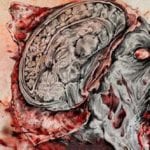 Weird Stuff
Weird Stuff  Weird Stuff
Weird Stuff  Movies and TV
Movies and TV 10 Weird Ways That TV Shows Were Censored
 Our World
Our World 10 Places with Geological Features That Shouldn’t Exist
 Crime
Crime 10 Dark Details of the “Bodies in the Barrels” Murders
 Animals
Animals The Animal Kingdom’s 10 Greatest Dance Moves
 Movies and TV
Movies and TV 10 Box Office Bombs That We Should Have Predicted in 2025
 History
History 10 Extreme Laws That Tried to Engineer Society
 History
History 10 “Modern” Problems with Surprising Historical Analogs
 Health
Health 10 Everyday Activities That Secretly Alter Consciousness
 History
History Top 10 Historical Disasters Caused by Someone Calling in Sick
 Weird Stuff
Weird Stuff 10 Wacky Conspiracy Theories You Will Need to Sit Down For
 Movies and TV
Movies and TV 10 Weird Ways That TV Shows Were Censored
 Our World
Our World 10 Places with Geological Features That Shouldn’t Exist
Who's Behind Listverse?

Jamie Frater
Head Editor
Jamie founded Listverse due to an insatiable desire to share fascinating, obscure, and bizarre facts. He has been a guest speaker on numerous national radio and television stations and is a five time published author.
More About Us Crime
Crime 10 Dark Details of the “Bodies in the Barrels” Murders
 Animals
Animals The Animal Kingdom’s 10 Greatest Dance Moves
 Movies and TV
Movies and TV 10 Box Office Bombs That We Should Have Predicted in 2025
 History
History 10 Extreme Laws That Tried to Engineer Society
 History
History 10 “Modern” Problems with Surprising Historical Analogs
 Health
Health 10 Everyday Activities That Secretly Alter Consciousness
 History
History Top 10 Historical Disasters Caused by Someone Calling in Sick
10 Strange Facts About The Mysterious Death Of Rasputin
On January 1, 1917, the body of Grigori Rasputin, the advisor to the rulers of Tsarist Russia, was found trapped under the frozen surface of the Neva River. He’d been shot three times and horribly mutilated; his killers, it seemed, had even gouged out his right eye.
Everyone was a suspect. Rasputin was seen as a sorcerer and a corrupting influence on the tsar. He was hated by the Tsarists and the Bolsheviks alike. Even outside Russia, he’d made powerful enemies. Prince Felix Yusupov took the credit for Rasputin’s death, claiming that he and four co-conspirators had killed him together. And to this day, Yusupov’s story is the one that usually appears in the history books.
But Yusupov’s confession didn’t fit a single one of the facts. Every single detail in his story contradicted the autopsy and the evidence—and to this day, no one really knows for sure how Grigori Rasputin met his grisly end.
10 The Death Threat The Morning Before He Died
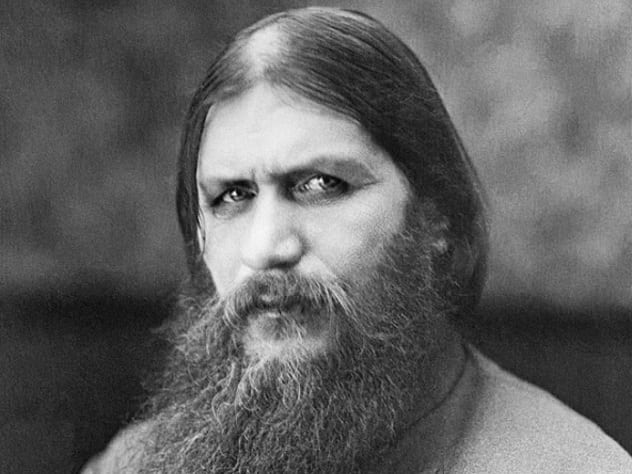
On the morning of December 29, 1916, Rasputin received a strange phone call. The voice on the other line, he told his daughter Maria, wasn’t one he recognized. The message, though, was clear: Rasputin’s days were numbered.
It was a death threat, though by no means the first one Rasputin had received.[1] At this stage in his life, Rasputin was used to getting multiple death threats every day. They would come in the mail or through the phone, always warning him that he deserved to die for the greater good of Russia.
This one, though, deeply unsettled him. Multiple sources described Rasputin as “nervous” and “agitated” that day. For some reason, after countless threats on his life, the one he received the morning before he died terrified him.
Nobody knows who placed the call. The only thing we know for sure is that it wasn’t Felix Yusupov, the man who has taken credit for Rasputin’s death. Yusupov spent the day trying to charm his victim so that he could lure him out to his home, and nobody involved in his conspiracy has ever claimed responsibility for the call.
9 The Cyanide That Failed To Kill Him
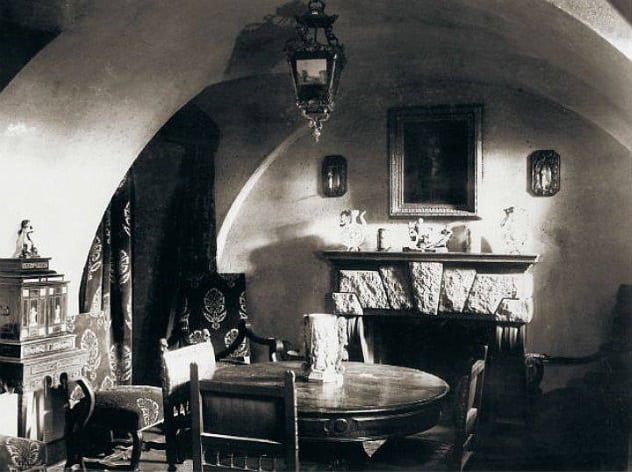
Yusupov’s plan was to poison Rasputin. He lured Rasputin out to his home, where he had plates full of cakes and wine that had been laced with cyanide by one of his co-conspirators, Dr. Stanislaus de Lazovert. The plan was to feed Rasputin the poisoned food and watch him die.
There is no question that Rasputin went to Yusupov’s house. The last person who saw him was his daughter, Maria, to whom he bid goodbye at 11:00 PM on December 29. Everything that happened after that, though, is a mystery.
Yusupov claims that he fed Rasputin the poisoned cakes and wines and that Rasputin gorged down enough cyanide to kill an elephant. But no amount of poison would hurt him. Instead, Rasputin kept asking for more.
His story, though, doesn’t quite add up. The autopsy notes say that Rasputin’s body showed “no trace of poison.”
Nobody knows for sure why there was no poison in his body. Yusupov’s story seems to imply that Rasputin really did have supernatural powers, but there are certainly other explanations.
Dr. Lazovert, years later, would claim that he only pretended to poison the cakes out of a pang of conscience—but not everybody’s convinced he was telling the truth. More recently, forensic scientist Dolly Stolze concluded that Rasputin was poisoned, but the doctor performing the autopsy missed the signs.[2]
But then, of course, there’s always the other possibility: Yusupov could have lied.
8 The Gunshot That Failed To Kill Him
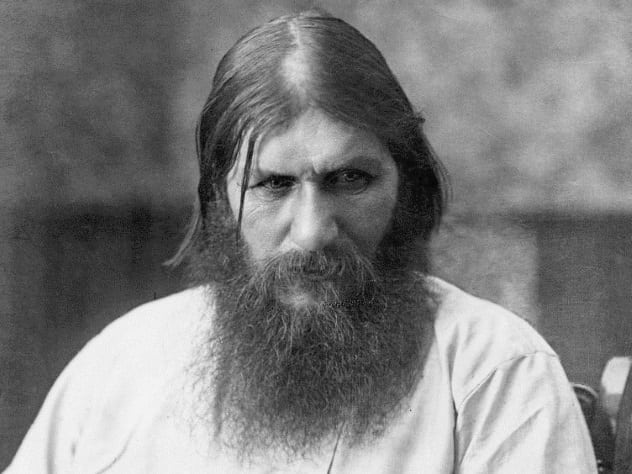
Frustrated that his poison didn’t work, Yusupov pulled out his pistol and shot Rasputin in the chest. Rasputin collapsed onto his back, blood spilling out of his body, and convulsed in spasms. It took a full minute for his body to become still, but by then, Yusupov’s co-conspirators had rushed into the room.
“The doctor [Lazovert] declared that the bullet had struck him in the region of the heart,” Yusupov wrote in his memoirs.[3] “There was no possibility of doubt: Rasputin was dead.”
The conspirators, he claims, then drove to Rasputin’s house, one of the men dressed up in Rasputin’s clothes to convince the neighbors he’d made it home safely that night. Then they came back and got ready to dispose of Rasputin’s body.
“Then a terrible thing happened,” Yusupov wrote. “With a sudden violent effort Rasputin leapt to his feet, foaming at the mouth.”
Yusupov and the other men ultimately shot Rasputin several more times before one of the conspirators, Vladimir Purishkevich, finally took him down with a gunshot to the head. Even while they tied him up and threw him into the river, though, Yusupov insists that Rasputin’s body continued to move.
“I realized now who Rasputin really was,” Yusupov wrote. “It was the reincarnation of Satan himself.”
7 The Autopsy That Contradicts Everything Yusupov Said
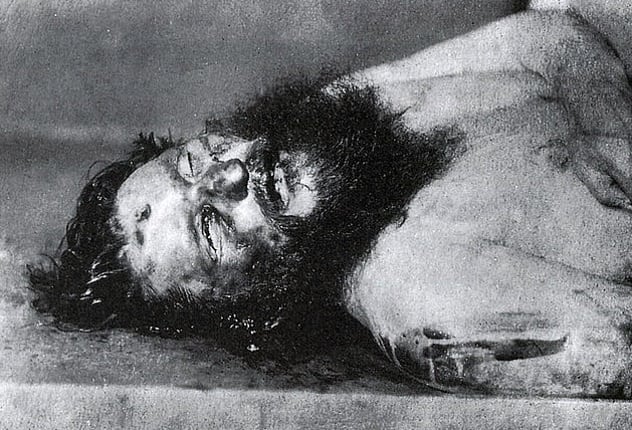
Yusupov’s story certainly is exciting—but it doesn’t fit the facts. The autopsy report on Rasputin’s body, conducted by Professor Dmitry Kosorotov, contradicts every single word.
In his memoirs, Yusupov claims that he shot Rasputin in the heart and even says that he had Dr. Lazovert check the body and confirm that was where the bullet had hit its mark. Kosorotov’s autopsy, though, found only three bullet wounds, and not a single one had even come close to the heart. Instead, the bullets went through his stomach, liver, kidney, and skull, with wounds that no physician could possibly mistake for a gunshot to the heart.[4]
Likewise, Yusupov claimed that Rasputin was taken down by a long-range shot from Purishkevich that took him in the back of the head. The bullet in Rasputin’s skull, however, had entered from the front at point-blank range, while Rasputin was lying on the ground.
It’s hard to reconcile Yusupov’s story with the facts. Some have suggested that he blew the murder up to make Rasputin more of a threat—but his account is nowhere near the truth. It’s almost as though Yusupov had no idea how Rasputin died.
6 The Rumor That Rasputin Drowned
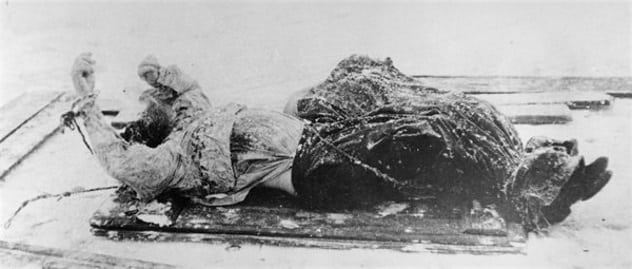
Yusupov claims that he saw Rasputin move, even after he’d taken a bullet to the skull. Still, the co-conspirators tied up Rasputin’s arms and legs, wrapped up his body in a piece of heavy linen, drove it to the top of a bridge, and hurled it into the water.
Legend has it that Rasputin was still alive when they threw him in. When he was found, his hands were unbound and lifted over his head. He’d freed his hands under the water, Rasputin’s daughter Maria would later claim, and died drowning.
It’s very difficult to tell what the autopsy says. During the trial, an expert witness claimed that the autopsy showed “there was air in Rasputin’s lungs” and that he had still been alive when he was thrown into the water.[5]
But this is a rare case where even reading the autopsy report doesn’t give us a clear answer. For some reason, different transcriptions say different things. Even today, you can find copies of Kosorotov’s original autopsy that say there was no water in his lungs and others that say there was. We’ve even found versions of Kosorotov’s autopsy that unambiguously claim Rasputin was alive, saying, “The victim was still breathing when he was thrown into the river.”
Somewhere along the line, whatever Kosorotov wrote was changed. Did the rumor pervade so far that people rewrote his autopsy? Or was the report altered to hide that Rasputin was still alive?
5 The Horrible Mutilation Of His Body And Genitals
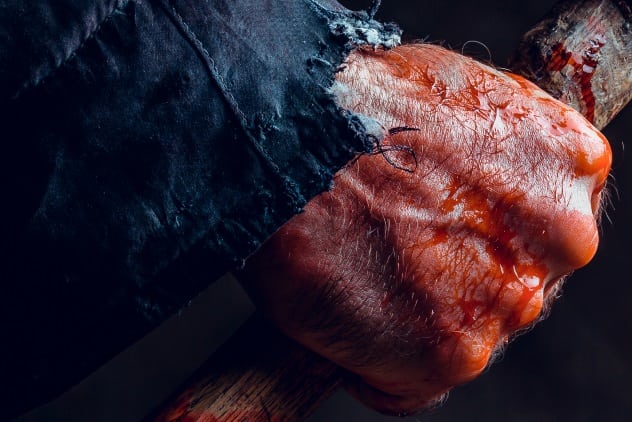
Whoever killed Rasputin didn’t just shoot him. They brutally and horribly mutilated his corpse.
The description, in Kosorotov’s autopsy, is nothing short of horrifying:
The left-hand side has a gaping wound inflicted by some sharp object or possibly a spur.
The right eye has come out of its orbital cavity and fallen on to the face. At the corner of the right eye the skin is torn.
The right ear is torn and partially detached. The neck has a wound caused by a blunt object. The victim’s face and body bear the signs of blows inflicted by some flexible but hard object.
The genitals have been crushed due to the effect of a similar object.[6]
The wounds, Kosorotov would later say, appeared to have been inflicted after Rasputin had died. This wasn’t the result of a violent scuffle. It was the brutal desecration of a dead body, a merciless beating that isn’t mentioned anywhere in Yusupov’s confession.
There are explanations. Some have theorized that Rasputin may have incurred these wounds in the water, while his body floated and dragged underneath a thick layer of rough ice. The ice, it’s believed, may also have broken the ropes off of Rasputin’s wrists.
But every explanation is nothing but speculation. All we know for sure is that his body was mutilated; whether it was by the force of man or the force of nature, we cannot know for sure.
4 Yusupov’s Strange Insistence On Taking Credit
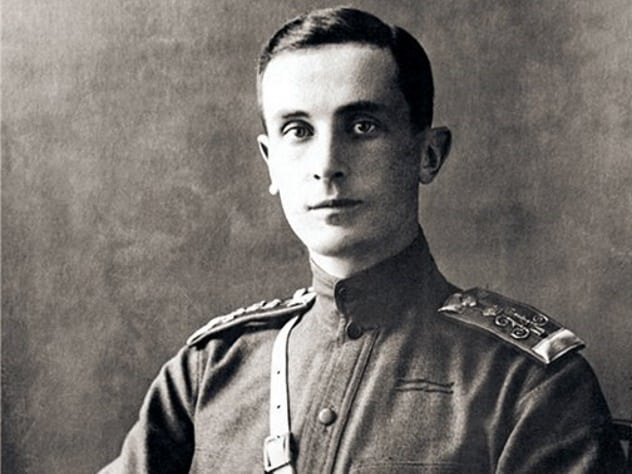
Yusupov and his co-conspirators went to great lengths to cover up Rasputin’s death. They faked him driving home, they threw him in the river, and Yusupov repeatedly told the police that the gunshots from his house had just made by a drunken guest shooting at a dog.
According to police reports, though, the conspirators confessed pretty well immediately. The officer sent to Yusupov’s house, following up on reports gunshots, said that Purishkevich threw open the door and declared:
Listen here, he [Rasputin] is dead, and if you love the Tsar and the Motherland, you’ll keep this quiet and won’t tell anyone a thing.[7]
The police certainly found bloodstains in Yusupov’s backyard, even if the autopsy didn’t fit his story. And while he denied the murder at first, Yusupov started hungrily trying to profit off his reputation as soon as he was implicated. He even ended up writing a whole memoir describing how he’d killed Rasputin in intricate, storybook-like detail.
When an MGM film called Rasputin and the Empress came out about Rasputin’s death, Yusupov even sued the filmmakers in a court case that, in the end, had Yusupov put down on the legal records as the man who killed Rasputin.
3 The British Spy Who Might Have Killed Him
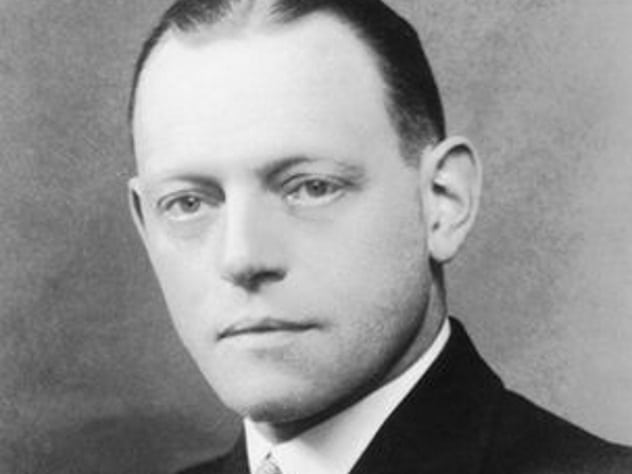
Every bullet in Rasputin’s body, according to the autopsy, came out of a different caliber gun. At least three people—or at least three guns—had to have been involved in his death.
The bullet holes in his stomach and kidney could have been made by Yusupov and Purishkevich’s guns, but the one in his skull didn’t fit. It was made with a revolver, specifically, according to the most popular theory, a .455 Webley—a gun none of the conspirators carried.
A British friend of Yusupov’s named Oswald Rayner, though, carried a .455 Webley on him at almost all times. And though Yusupov denies that he was ever there, a lot of people think that Rayner fired the shot that finished Rasputin off, all under the orders of British Intelligence.
The British had a vested interest in seeing Rasputin dead. He was trying to broker peace between Russia and Germany, and his treaty would have turned the tide of World War I against the Allies. In Rasputin hadn’t died, it’s possible that the Germans would have won the war.
And there’s a letter that seems to completely give it away. A man named Stephen Alley, stationed in Petrograd, sent a missive to England on January 7, 1917, that read:
Our objective has clearly been achieved. Reaction to the demise of ‘Dark Forces’ has been well received by all, although a few awkward questions have already been asked about wider involvement.
Rayner is attending to loose ends and will no doubt brief you on your return.[8]
2 The MI6 Archives That Say Otherwise

The British government, more than 100 years later, still denies having anything to do with Rasputin’s death. The suggestion that Rayner killed Rasputin, they insist, is “an outrageous charge, and incredible to the point of childishness.”
They might be telling the truth. Rayner was not listed as an active agent when Rasputin died, and although countless historians have scoured through every available MI6 record, they can’t find the slightest trace of evidence that the British were involved.[9]
Some of the arguments against Rayner fall flat, as well. One book dedicated to proving Rayner was the killer claims that the bullet in Rasputin’s head could only be “the work of a professional killer”—but that bullet, as we already know, was fired at point-blank range while Rasputin was lying down. It was hardly an expert shot.
Nor was the murder. Police Chief Serda described Rasputin’s murder as the work of “incompetent” killers whose methods were clumsier than he had ever seen in his entire career.
It was, in short, hardly the work of a secret agent.
1 The Burning Body That Sat Up

The most popular explanation for Yusupov’s outrageous story is that he was trying to erase a guilty conscience. He’d killed a defenseless man in cold blood, but he still wanted the people to believe that he was a hero. And so he changed the truth, making himself look better by selling Rasputin as a demonic monster who couldn’t be killed.
But one strange moment in March 1917 almost makes it tempting to believe that Yusupov was telling the truth: that Rasputin really a supernatural being.
A group of soldiers exhumed Rasputin’s body, threw it onto a pile of logs, doused it in gasoline, and set it on fire. They destroyed his body, afraid his tomb would become a monument to the Tsarist regime.
A whole crowd of villagers came out to watch Rasputin’s body burn—and almost every one of them insists that they saw his decomposing corpse rise up in the fire.[10]
There are scientific explanations, of course. It’s been speculated that Rasputin’s tendons shrank in the fire, causing his body to bend at the waist. Or else the whole thing has been written off as a great mass delusion.
But Rasputin, they say, predicted every bit of it. In a letter that Rasputin (supposedly) wrote to Tsarina Alexandra shortly before his death, he said: “I feel that I shall leave life before January 1.”
Even dead, the sorcerer predicted, he would not be left in peace. His body would be burned, his ashes scattered into the winds.
Read more facts about the deaths of prominent historical figures on Top 10 Wild Facts About The Death Of Joseph Stalin and 10 Truly Strange Facts Surrounding Princess Diana’s Death.



